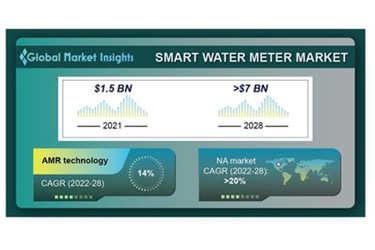Water Shortages Carve Out Profitable Growth Path For Smart Meter Market
By Vijay Ovhal

With the rising emphasis on water conservation, the smart water metering market is set to witness commendable growth in the coming years, given the increasing product acceptance due to looming water security concerns.
As the planet experiences an enormous requirement to conserve natural resources, especially water, the smart water metering market size will garner appreciable gains attributed to the increasing demand for efficient water consumption.
The primary reason smart meters have gained tremendous traction over the years is their capability to enable water consumption and reduce water bills while helping keep track of real-time data. Indeed, water conservation has become the need of the hour, as is evident from the measures taken toward the same across myriad geographies.
In February 2023, for instance, under the Bipartisan Infrastructure Law and Inflation Reduction Act, the Biden-Harris administration announced a critical infrastructure investment worth USD 728 million to aid water conservation in the Upper Colorado River Basin; provide clean, reliable drinking water to communities; and accomplish projects to enhance water supply reliability.
Frequent Installation Of Smart Meters To Carve An Upward Growth Trajectory
With a considerable rise in efforts toward preventing unnecessary wastage and saving water, the deployment of smart meters has become commonplace in recent years.
To quote a few instances…
In February 2023, Toowoomba Regional Council (TRC) declared its plan to install some 22,000 smart water meters across the city beginning in March 2023. The move came out as part of the council's goal to achieve 66,000 meter installations. The digital reading obtained through these water meters will offer analytics to the residents, alerting them and the authorities about any spike in usage and leaks, thus saving valuable water.
Similarly, in a recent turn of events, the Authority for Public Services Regulation (APSR), Muscat, informed that the number of national support system accounts in the Sultanate of Oman recorded a 35% uptick, with over 400,000 smart water meters installed in the country until the end of 2022.
Growing concerns pertaining to water scarcity and the rapid adoption of water conservation practices across the globe have propelled smart water meter sales, which, in consequence, will stimulate the smart water metering market outlook in the years to come.
Stringent Regulations Remain A Key Growth Driver
Owing to the standards and criteria enforced with regard to the conservation of water across several economies, the smart water metering market is controlled by a stringent regulatory framework. To illustrate, the EC Directive 2000/60/EC mandates respective countries to prioritize water conservation and prevention of water wastage, especially in drought-ridden areas of the European Union.
These regulations have favored the deployment of advanced water metering systems and technologies such as automatic meter reading (AMR) and advanced metering infrastructure (AMI). Water utilization data collected by AMI-based smart meters help determine water distribution issues and manage water allocation efficiently, which eventually serves to comprehend consumer requirements.
On these grounds, in February 2023, Birmingham Water Works (BWWB), during a board meeting, put forth a Request for Proposal (RFP) to install AMI to deal with faulty billing issues. The technology is expected to benefit BWWB customers by offering nearly 100% accurate billing while augmenting the utility’s capability to detect leaks.
United States — A Major Revenue Pocket
With some of the states in the region consistently contending with droughts and subsequent water shortages, the need to reduce water use across the U.S. remains a key concern, which is why the country is expected to be one of the foremost growth grounds for the smart water metering market.
This has paved the way for several technological innovations in the field of water metering across the country, which will benefit the smart water metering market over the coming years.
Say, for example, in February 2023, Olea Edge Analytics, an intelligent solutions and services provider for the water utility industry, introduced a pilot program to install its Meter Health Analytics (MHA) technology to 25 large commercial water meters in Elsinore Valley Municipal Water District (EVMWD) service area in California. The incorporation of these technologies can have an overblown impact on utility revenue and water loss, which will serve to propel the smart water metering industry.
The Way Ahead
Water security is a looming issue as the world faces continuous challenges in ensuring the availability, accessibility, and sustainability of water resources. With a massive growth in world population, increasing demand for water in industry, agriculture, and urban areas coupled with the impacts of climate change, the need to find innovative solutions to improve and maintain water security is of utmost significance.
The inadequate wastewater treatment across several economies, especially in informal and rural settlements, is also a major concern as most of the wastewater that is generated is released without any treatment into the environment. This leads to public health and environmental challenges, prompting governments and authorities to take necessary initiatives to combat the limited technical capacity to maintain and operate effective treatment systems.
To that end, in February 2023, the Indian Government, in partnership with states, rolled out a flagship scheme — Jal Jeevan Mission (JJM) - HarGhar Jal. The program aims to ensure adequate tap water supply of IS:10500 standard on a long-term and regular basis to every rural household in the country by 2024.
Needless to mention, several companies participating in the smart water metering market are engaged in periodic mergers & acquisitions to consolidate their position in this business. Supported by a strong legislative framework and the efforts undertaken by numerous organizations and provincial governments, the smart water metering industry is on its way to charting out a profitable growth path in the foreseeable future.
Source: https://www.gminsights.com/industry-analysis/smart-water-metering-market
